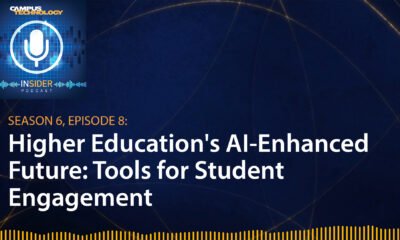Education
AI cheating in US schools prompts shift to in-class assessments, clearer policies

Artificial intelligence is reshaping education in the United States, forcing schools to rethink how students are assessed.
Traditional homework like take-home essays and book reports is increasingly being replaced by in-class writing and digital monitoring. The rise of AI has blurred the definition of honest work, leaving both teachers and students grappling with new challenges.
California English teacher Casey Cuny, a 2024 Teacher of the Year, said, “The cheating is off the charts. It’s the worst I’ve seen in my entire career.”
He added that teachers now assume any work done at home may involve AI. “We have to ask ourselves, what is cheating? Because I think the lines are getting blurred.”
SHIFT TO IN-CLASS ASSESSMENTS
Across schools, teachers are designing assignments that must be completed during lessons. Oregon teacher Kelly Gibson explained, “I used to give a writing prompt and say, ‘In two weeks I want a five-paragraph essay.’
These days, I can’t do that. That’s almost begging teenagers to cheat.”
Students themselves are unsure how far they can go. Some use AI for research or editing, but question whether summarising readings or drafting outlines counts as cheating.
College student Lily Brown admitted, “Sometimes I feel bad using ChatGPT to summarise reading, because I wonder is this cheating?”
POLICY CONFUSION AND NEW GUIDELINES
Guidance on AI use varies widely, even within the same school. Some classrooms encourage AI-assisted study, while others enforce strict bans. Valencia 11th grader Jolie Lahey called it “confusing” and “outdated.”
Universities are also drafting clearer rules. At the University of California, Berkeley, faculty are urged to state expectations on AI in syllabi. Without clarity, administrators warn, students may use tools inappropriately.
At Carnegie Mellon University, rising cases of academic responsibility violations have prompted a rethink. Faculty have been told that outright bans ‘are not viable’ unless assessment methods change.
Emily DeJeu, who teaches at Carnegie Mellon’s business school, stressed, “To expect an 18-year-old to exercise great discipline is unreasonable, that’s why it’s up to instructors to put up guardrails.”
The debate continues as schools balance innovation with integrity, shaping how the next generation learns in an AI-driven world.
(With inputs from AP)
– Ends
Education
Inside the world of Kenya’s ‘shadow scholars’ paid to write essays for UK students | Universities

There is a secret industry that generates billions of dollars a year. Its workers are bright, industrious and completely anonymous. Their job is writing essays to order for students – in the UK and elsewhere – to help them get good degrees.
These are “shadow scholars”, highly educated Kenyans who earn a living by working for essay mills. They are contracted to ghostwrite essays, PhD dissertations and other academic papers for students across the world, who pay a fee then pass off the work as their own.
The role is not unique to Kenya. There are similar writers in India, Pakistan and any other number of countries, including the UK, but Kenya has been identified as a hotspot, with an estimated 40,000 ghostwriters working in Nairobi alone.
They are the subject of a new film that talks for the first time to the young Kenyans who may be writing an essay or dissertation on any topic from mechanical engineering, nursing or quantum physics to Jane Austen, linguistics or Ho Chi Minh.
Smart, ambitious, well-educated and tech-savvy, they worked hard to get to university, they graduated with good degrees, but there are no jobs. Instead they spend their days – and nights – logging on to essay-writing platforms, scrolling down the list of assignments and making their bids to win the work.
The cameras follow the sociologist and Oxford professor Patricia Kingori as she travels to Nairobi to interview the writers and explore the power dynamics that enable students in countries such as the UK to secure degrees and begin lucrative careers without doing their own work.
She is bowled over by the young people she meets. “They’re incredible,” she told the Guardian. “I felt like I was entering a kind of elite athletes’ camp. It’s like being a recreational jogger and then suddenly entering an Olympic village.
“You’re able to write an essay, on a subject you’ve learned nothing about, in six hours? How are you able to do this? They have to meet these deadlines, otherwise they get badly reviewed and they get kicked off the platform. They don’t get extensions. They don’t get sick notes. They just have to do it.”
Kingori, who is Kenyan-born, meets Mercy, a graduate and mother of Angel, who works through the night, sometimes having to master two different subjects for two different assignments in the space of 12 hours. She has had only three hours’ sleep, but she needs the money.
With the money he has made, Chege, who describes himself as one of Kenya’s academic writing pioneers, paid for his own education, supported his sister through her degree, built his parents a house and bought himself a car.
The writers create fake IDs, using white profiles and names, because they say it helps convince clients they are up to the task. “If you go online now and try to find help with an essay, invariably they sell you the service as if it’s coming from somebody that’s in the UK or the US,” said Kingori.
“Nothing that I’ve seen will tell you that this is somebody in Nairobi. There’s this idea that this could not be coming from an African country. This level of intellect and skills could not be coming from people in Kenya.
“Africa isn’t the place that educates us, right? This is the place where we do all the cake sales for, it’s not the place that is actually propping up all of our educational institutions. So I think turning that on its head is really important.”
One of the writers in the film says: “They want our ideas. They just don’t want us.”
after newsletter promotion
Another says: “There’s no Kenyan writer who called an American citizen and asked them to do an assignment for them.”
The best paid can earn as much as a doctor in Nairobi. Pricing can range from less than £1 a page to thousands of pounds for a whole dissertation. Adrian has written essays for students at the universities of Oxford and Leeds, among others. Asked about the ethics of what he does, he said: “For me, I’m gaining knowledge. I would pass that question to the client.”
On the other side of the world is Kate, a US student who was falling behind with her studies and sold nudes so she could pay $300 for someone else to write her essays. Her parents invested their life savings in her education, which is costing tens of thousands of dollars a year, and she cannot bear to let them down.
Essay mills were banned in England in 2022, but according to Thomas Lancaster, a computer scientist and expert on contract cheating at Imperial College London, students are still using them, though the advent of generative AI is changing the landscape.
“Contract cheating and the use of essay mills remains a major problem in UK higher education, as students are getting awards that they do not deserve. This is unfair to the vast majority of students, who are working and studying hard,” he said.
“Some students have moved to using genAI systems like ChatGPT in place of contracting to an essay mill. I’ve also heard that there is a market now for students who use genAI to create a first draft, but then hire a writer to check the content and to rewrite it so that it is not detected as AI-generated.”
Kingori is angry at what the film uncovers. “Power makes itself invisible so we don’t question whether things should be the way they are. It enrages me. This should not be why Kenya is on the map, and if the world was fair, these scholars would be able to operate on the world stage as themselves.”
All names have been changed. The Shadow Scholars can be seen in select UK cinemas from 16 September and on Channel 4 on 24 September at 10pm
Education
How to manage a part-time job alongside your student workload … and boost your CV at the same time | University guide

If you’re planning to go to university, you may also be thinking about getting a job while studying. But it can be difficult to know where to look, especially if you’re moving to an unfamiliar city.
The most important thing is to find a job that’s flexible enough to fit alongside your studies. With the third term increasingly quiet or even empty you might consider filling it with temporary work – but remember your main goal is to get a degree that opens the door to the career you want. Many universities, including Edinburgh, Birmingham and Brunel, recommend working no more than an average of 15 hours a week during term time so that your studies aren’t compromised.
Aside from the usual job search platforms such as LinkedIn, Indeed and Reed, there are other sites worth a look if you want flexible work either during term time or the holidays. Jobtoday, Caterer, E4s, StudentJob and JobsBear all list jobs around the UK, including casual work.
As well as searching on job sites, you could contact local catering companies – they often let you pick up waitering shifts as and when they suit you. From October, Christmas temp roles are worth looking out for as many retail and hospitality companies will be offering flexible working contracts during this time.
Working for a chain that has branches around the country is great because it can give you the flexibility of transferring to another outlet when moving between home and university and vice-versa.
When you get to university, your campus will have an employability or careers team. They should be able to give you guidance on finding jobs in the area, as well as helping you with your CV and cover letter.
Even if the role does not match what you hope to do for a living post-university, having a job while studying will equip you with essential life skills. All jobs involve being organised and punctual, many will help you build resilience and your communication skills as you deal with different people and situations.
Roles such as restaurant work can have great transferable skills such as conflict resolution (dealing with awkward customers), building rapport (with colleagues and not-awkward customers) and being able to work well under pressure. These will all serve you well on your CV.
“Increasingly, major graduate employers are prioritising skills over academic qualifications when selecting candidates,” says Claire Tyler, head of insights at the Institute of Student Employers, the biggest UK student recruitment community.
“We recommend students research the skill requirements of the graduate employers they may wish to apply to after university and then seek part-time work which will help demonstrate these skills.
“Developing skills during part-time employment work is an accessible way students can ensure they stand out in a competitive graduate job market.”
Education
No alcohol? No problem: how to make friends at university without booze | Universities

For as long as anyone can remember, drinking has been a key part of the student experience – but this is changing. An increasing number of young people are turning away from drinking, with a 2024 poll by Student Beans finding that half of first-year students did not plan to drink during their freshers’ week.
If you’re considering a teetotal uni experience, or want to limit your drinking, here are four places to look for sober fun.
Societies
One of the easiest ways to find like-minded people and make friends without alcohol is to join any society that you’re interested in. There are more than 10,000 societies across all universities in the UK, with at least 50 to choose from at most universities, many of which do not involve alcohol.
Georgia Burdis, a vice-president of activities at Northumbria University, says that for “students who don’t drink, university can still be a very rewarding social experience when you find the right spaces” and advises teetotal students to “seek out communities that align with your intentions rather than the social norms of alcohol consumption. This way you will naturally build meaningful friendships”.
Parties
It is absolutely possible to go to parties where people are drinking and still have fun while sober. Although it might be outside your comfort zone, try at least one to find out if you enjoy it.
If you want to go to a party with other people like yourself, there is a surprising amount of choice. Sober parties have fast become normalised, with events spreading across the country. In Glasgow, for example, Good Clean Fun puts on monthly ticketed events that combine a variety of musical genres with activities such as meditation.
Enjoy the outdoors
A study by the Mental Health Foundation found that 39% of students did not do regular exercise, often citing tiredness and a preference for socialising. So how about combining looking after your health with making friends in the process?
Most universities will have great sportsfacilities and a plethora of teams you can join, with something to suit all ability levels. Ask at your fresher’s fair to find the perfect fit.
For something more intrepid, outdoor societies such as Dundee University’s Rucksack club, the University of Plymouth’s Adventure & expo group and the University of London Mountaineering club take advantage of the local countryside and are open to people of all backgrounds and experience levels.
Games
You might think only mature students would enjoy playing board games – but you’d be wrong. One study by Edge Hill University (pdf) found that 26.9% of board game players are between the ages of 18 and 25.
There are a surprising number of games clubs and campus societies dedicated to them. Edge Hill has several, including the Poker and card games society, which says new members should “feel free to bring along any card game you wanna play and I’m sure we’ll enjoy playing too!”.
-

 Business2 weeks ago
Business2 weeks agoThe Guardian view on Trump and the Fed: independence is no substitute for accountability | Editorial
-
Tools & Platforms1 month ago
Building Trust in Military AI Starts with Opening the Black Box – War on the Rocks
-

 Ethics & Policy2 months ago
Ethics & Policy2 months agoSDAIA Supports Saudi Arabia’s Leadership in Shaping Global AI Ethics, Policy, and Research – وكالة الأنباء السعودية
-

 Events & Conferences4 months ago
Events & Conferences4 months agoJourney to 1000 models: Scaling Instagram’s recommendation system
-

 Jobs & Careers3 months ago
Jobs & Careers3 months agoMumbai-based Perplexity Alternative Has 60k+ Users Without Funding
-

 Podcasts & Talks2 months ago
Podcasts & Talks2 months agoHappy 4th of July! 🎆 Made with Veo 3 in Gemini
-

 Education2 months ago
Education2 months agoVEX Robotics launches AI-powered classroom robotics system
-

 Education2 months ago
Education2 months agoMacron says UK and France have duty to tackle illegal migration ‘with humanity, solidarity and firmness’ – UK politics live | Politics
-

 Podcasts & Talks2 months ago
Podcasts & Talks2 months agoOpenAI 🤝 @teamganassi
-

 Funding & Business3 months ago
Funding & Business3 months agoKayak and Expedia race to build AI travel agents that turn social posts into itineraries



















